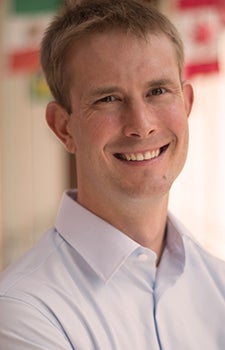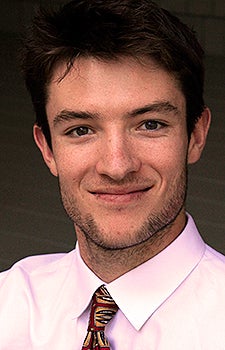Big Picture Economics
A new major combines two of USC Dornsife’s most popular majors: international relations and economics — two disciplines that go hand-in-hand.
“Each informs the other,” said Ben Graham, assistant professor of international relations, who designed the international relations and the global economy (IRGE) major. “Students interested in the economy benefit by understanding international and domestic politics, and vice versa.”
Through the major, students acquire technical statistical and mathematical skills, a solid foundation in economic and international relations theories, and an understanding of how political institutions shape economic behavior.

Ben Graham, assistant professor of international relations, designed the IRGE major. The two disciplines inform each other, he said, and students learn about the politics behind the global economy. Photo by Peter Zhaoyu Zhou.
In addition to prerequisite courses in macro- and microeconomics and international relations, students take courses in calculus, statistics and politics of the world economy. They also have the opportunity to focus their studies in a particular region of the world.
“Students gain a very politically informed understanding of the global economy,” Graham said.
Many students were already building their academic studies around double majors in the two disciplines. The new major allows them to delve into international relations and economics without having to take overlapping courses to meet the individual major requirements.
Senior Matthew Biggar selected the major because he is interested in starting his career in political risk consulting, in which he would evaluate and quantify private sector companies’ risks if they invest in countries overseas.
“That line of work requires knowledge of governance and also of the economic landscape,” Biggar said. “I find that many issues we study have an economic underpinning to it, so by understanding economics it allows me to really understand the root of challenges in many countries.”

IRGE major Matthew Biggar will seek a career in political risk consulting. Through the major, he learns about the economic and political landscape of various countries. Photo courtesy of Matthew Biggar.
During his junior year, Biggar studied overseas in Brazil. He took classes that counted toward the IRGE major, including Brazilian foreign policy, international trade and the Latin American political economy, as well as intensive Portuguese classes.
“It was great to understand the Brazilian perspective on the global economy, specifically the effects of the ‘Washington consensus’ from the Brazilian perspective,” he said, referring to a set of 10 policies that the United States said indebted countries should adopt to increase economic stability and growth. “At USC, we learn it from the U.S. perspective. Being in a country that actually has been through it and felt the effects was really informative.”
Jamilyn Carter is a junior IRGE major with a minor in business at the USC Marshall School of Business. She’s interested in a career in the financial world working with hedge funds.
“Having a strong economics background is really important for me,” Carter said. “I’ll need to understand economic trends as well as human behavior.”

Junior Jamilyn Carter is preparing for a career in institutional finance. The IRGE major gives her a foundation in economics and a global perspective on the world’s economies. Photo courtesy of Jamilyn Carter.
Recently, she took the international relations course “The Global Economy 2030,” which examines some of the main forces expected to shape the economy in 2030. The course has helped her to understand how the international landscape plays a role in the U.S. economy. Forces around the world are always going to impact America’s economy, she said.
“In today’s world everything is dynamic,” Carter said. “Especially with business, everything is globalized so you need to understand what’s going on around the world. You also need to know how to work with people outside of the United States — how they do business and what the political climate is in their country.”